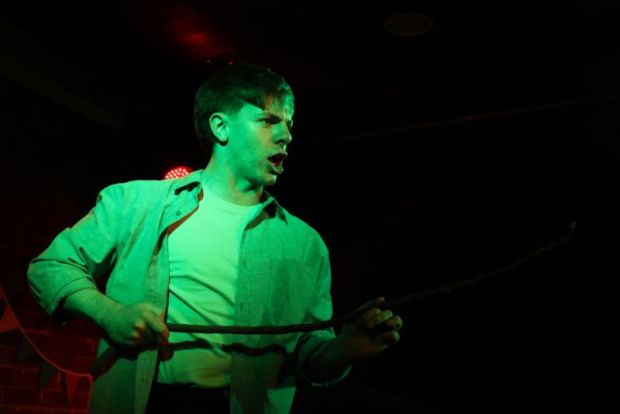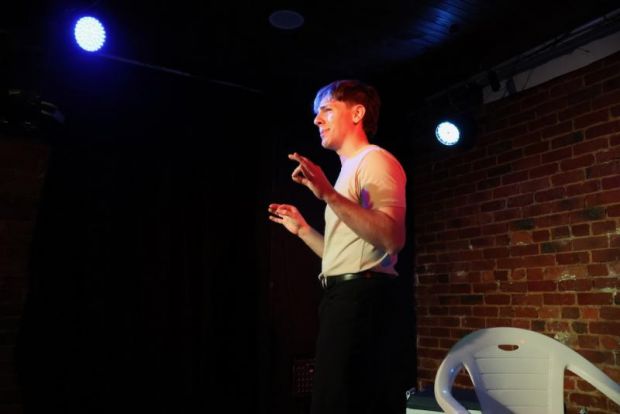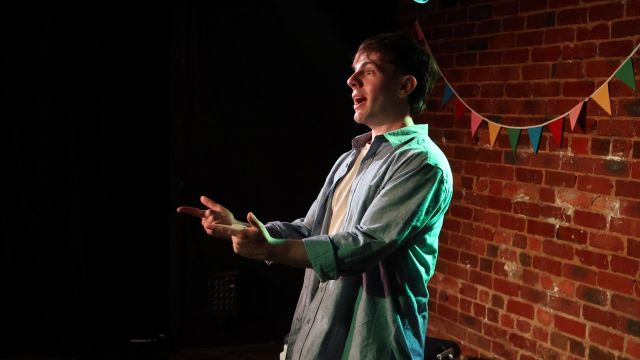Proud
When we enter the theatre that sentimental and self-serving song, ‘I Still Call Australia Home’ is playing – setting up the question, what is home these days?
Jack (James Starbuck) is a naïve young man in the suburbs. He is our Narrator, and he brings all other characters to life in this monologue.
Jack looks up to his older brother George. Both revere their grandfather, Poppy, a WWII veteran who – for undisclosed reasons – never wears his medals and keeps his service revolver in a locked shed... Dad cleared out, but the brothers are happy growing up and they love playing ‘soldiers’.

Then something unthinkable happens: George marries Jenny, a ‘migrant’ (ethnicity unspecified) and the wedding happens in George and Jack’s – and Poppy’s – back yard! The bride’s ethnic family crowd into the space. Surprisingly, this is the first time Jack, Poppy, and George and Jack’s mother (a shadowy figure) have met Jenny... Racist Poppy takes George aside and tells him off – and a disorientating chasm opens between the previously loving brothers. Not surprisingly, George – always characterised by Jack as solid, calm and rational - stays away. Jack is isolated, lonely. Everything’s changed. Who’s to blame? Her! It’s all her fault.
So begins Jack’s slide into the embrace of the ’Proud Brothers’ – a neo-Nazi, White Supremacist, Australia First group, now frequently on our streets, draped in Australian flags. But possibly - and unfortunately – if the slide feels easy, it’s because playwright James Watson withholds some of Jack’s explanatory character traits (his childhood was not so happy) until Jack is well and truly in the foetid embrace of the Proud Brothers, especially their charismatic leader – who supplies simple answers to Jack’s confusion – as well as sensing that Jack is someone he can use.

The writing here is on the money: Watson shows the manipulations and misdirection that fascists play on to exacerbate rage – false answers to real problems. Like how ‘they’ are taking ‘our’ country from us. That rings a bell with Jack: Jenny took his brother away from him...
These transitions and interactions are a real challenge for James Starbuck – and he handles them well. As Proud is a monologue, Starbuck must play the increasingly febrile Jack and, say, the confident authoritarian fascist. Starbuck plays Jack as an initially aw shucks seemingly appealing young bloke, but the catch is that he can seem suddenly merely stupid. That’s not especially interesting or engaging. What Jack’s really mourning is the incomprehensible loss of his brother to The Other but that seems – in the place where it comes in the monologue – not enough.
In other words, Watson has the forces at play in his grasp, but he structures them in such a way as to weaken tension. He wants, I assume, to show us how a nice boy can become a fascist – something like what Sartre more subtly did in Childhood of an Anti-Semite. Jack’s becoming a fascist might much better be a pay-off if the factors underlying it were set up earlier – just as hints.

By the end, as Watson pushes Jack to murderous rage and possible insanity, it feels contrived. Watson wants to warn us about the appeal of fascist ideology – that’s obviously a legitimate and good intention – but to do that, the text needs some cause-and-effect restructure and a greater emphasis on the role of Poppy, say, (why does he never wear his medals? Shame?) – or the absent father – and even to the extent of trapping us into almost agreeing with the fascist leader. The One Nation vote is increasing. Proud is a passionate and deeply serious play but it needs to dramatise why at greater depth.
Michael Brindley
Photographer: Emelia Williams
Susanne Dahn also attended Proud and reviewed the production
If you want to feel deeply proud of the extraordinary young talent that emerging Australian theatre is currently bursting with, by way of some quite unsettling and provocative content, see this show. You won’t be able to stop thinking and talking about it.
Particular accolades are due to the brilliant writer of this thoughtful one-act monologue James Watson and the exceptional talent of actor James Starbuck, who brings such emotional depth to this knockout solo performance.
Together they take the audience into the pit of ugliness that is racism and fascism without us losing affection for the central character Jack. How did they do this? Or is it that we all have a Jack in our families somewhere?

In this piece Jack is a young man who has worshipped both his older brother and his Vietnam veteran granddad. His brother marries a non-Anglo Saxon, grandad isn’t thrilled about it and family relationships are strained and they break. Jack is lonely and lost and distant cousin Greg seizes the opportunity to spread the seeds of right-wing influencers.
Roll up Andrew Tate, Josh Rogan and Charlie Kirk and you get Mick Brandon. And Mick Brandon gets Jack. And Jack falls deeper into the ugly places.
Most audiences at Carlton’s Motley Bauhaus already know that you don’t need planks, protein shakes and paleo beards to be a real man
What they might struggle to understand though is the awful hold that right-wing, racist rabble rousers have again come to have on lonely and lost young men and the ease by which they can insidiously transform them into fascists and white-supremacists.

Solo performances are high risk, particularly if the performer is portraying multiple characters, but Starbuck is safe hands. Starbuck makes it believable from the get-go, makes us like him from the get-go, ramping up the tension bit by bit, controlling the monologue with both tightness and the occasional loose physicality and costume change.
Starbuck stamps his authority on this performance. We know and love men like Jack, so what happens when, in seeking their new platoon, in owning their determination not to be replaced, in defending themselves against perceived attack, these men like Jack stop being loveable and become fearsome? I could not help but see a reprise of the young Marlon Brando pulling off a similar and stunning feat of contradiction.
This is a Famous Last Words production, with production and direction respectively by Co-Creative Directors Emelia Williams and James Watson. On stage, all Starbuck has with him are an esky and two plastic backyard chairs and Watson’s use of these chairs is intelligent and dynamic making the stage feel full of the characters from Jack’s life.

The sound design of Oscar Sarre reminds us of how here and now this topic is, bringing us the voices of Donald Trump, Tony Abbott, Peter Dutton, Scott Morrison, Pauline Hanson, as well as the chill of the hospital room and the recurring accelerating soundscape of menace signalling that bad things might be going to happen.
This work puts extremism literally at centre stage and forces us to reflect on the thin membrane, the sometimes single flinch, between freedom to think and freedom to hate. At a time when extremism is all around us and ramping up, such reflection is all the more necessary.
Proud is the best kind of art because it forces us to think and talk and try to understand so that we might find more and more ways away from hate. Crying for real is always better than pushing it down. And love is always better than either.
Subscribe to our E-Newsletter, buy our latest print edition or find a Performing Arts book at Book Nook.

